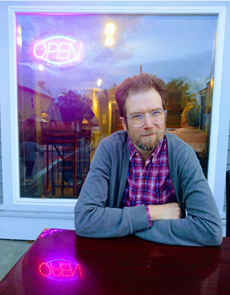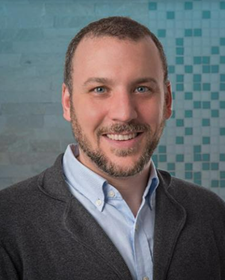
Lacanian Psychoanalysis: An Introduction in Reverse
When: Saturday, December 18, 2021
9:00 – 12:00 PM
Where: Zoom - You will receive Zoom link upon paid registration.
Cost: Non-members: $35
Members: $25
New professionals (within 3 years): $15 - honor system
Students: $10
3 CEU's will be offered upon successful completion of the course evaluation (to be sent after the course)
Forty years after Jacques Lacan's death, his teaching—kaleidoscopic, enigmatic—continues to illuminate and unsettle. It was a most idiosyncratic "return to Freud," one that engaged with linguistics, anthropology, art, mathematical logic, and topology. But we should make no mistake—Lacan's teaching was always grounded in the fundamental questions: what is this endeavor, ultimately, that we call psychoanalysis? And what is it that makes one an analyst?
To coherently encapsulate Lacan's teaching is an impossible thing—just as impossible as trying to articulate the transformations that occur within any given psychoanalytic treatment. This condition of impossibility shouldn't deter us (psychoanalysis itself, after all, was identified by Freud as one of the "impossible" professions). So, impossibly, we will set out together to begin mapping the terrain of Lacan's work—at least to mark some of its contours. Simultaneously, we will try to elucidate something about the analysand's traversal of the analytic path.
A survey of this kind tends to start exactly where one would think: the beginning. But this presentation will follow instead the psychoanalytic logic of nachtraglichkeit: that is, we'll assume that we can only understand what came before from the vantage point of what comes after. So we'll read Lacan in reverse, beginning with the end and moving backwards from there. Key conceptualizations from his later work like the Borromean knot will be addressed first, shedding a retroactive light on everything that came before. In parallel fashion, we will take up the question of how an analysis affects the analysand and his or her symptom by starting at the end of the analysis, conceptualizing the arc of the analytic endeavor through the lens of the treatment's terminal point.
This presentation will root itself in clinical matters, employing Lacan's ideas for the purpose of deepening our inquiry into the nature of psychoanalytic practice. No previous engagement with Lacan's teaching is necessary, and all are welcome to join in the dialogue.
OBJECTIVES
1. Participants will become conversant in key aspects of Lacanian theory, including the three registers (real, symbolic, imaginary), object a, desire, and jouissance.
2. Participants will become familiar with essential features of Lacanian practice, including equivocal interpretation and the variable length session.
3. Participants will become aware of the Lacanian approach to the transference, differential diagnosis, and to the end of analysis.
PRESENTER
Jed Wilson, LICSW
Wilson is a Lacanian psychoanalyst in formation with a private practice in New Hampshire. He is a member of the Colorado Analytic Forum and of the School of Psychoanalysis of the Forums of the Lacanian Field. Formerly the clinical director of a community health center, he has extensive experience as a supervisor and educator. In addition to Freudian and Lacanian practice generally, Wilson's particular areas of interest include the treatment of psychosis and exploring the resonances between psychoanalysis and the arts.

DISCUSSANT
Rafael Cohen, LPCC
Rafael began his current professional path by pursuing a master’s degree in 2005. He focused increasingly on psychoanalytic thinking starting in 2009 through reading and attending seminars and classes at several different psychoanalytic schools and institutes. He continues to be engaged in this work as a lifelong learner in various ways including: writing, presenting, supervising, and teaching. Rafael has worked clinically with patients who are addressing a wide range of issues and diagnoses in both individual and group therapy. This work has taken place in a variety of different settings, including: outpatient clinic, short-term inpatient psychiatric hospital, long-term residential treatment center, and “diversion” programs within the legal system. Rafael’s clinical work and thinking is grounded in psychoanalytic theory and technique as understood mainly through the lineage of Freud and Lacan, with input from Bion, Winnicott, and others. This leads to a focus on language and the acts of speaking and listening through which it becomes possible to center the singular nature of each individual. Difference is prioritized over sameness because the unconscious and its various manifestations thoroughly undermine any useful concept of “normality,” generally reducing it to an instrument of conformity.

REFERENCES
Barnard, S., & Fink, B. (Eds.). (2002). Reading Seminar XX: Lacan's Major Work on Love, Knowledge, and Feminine Sexuality. SUNY Press.
Lacan, J. (1981). The Seminar of Jacques Lacan, Boox XI: The Four Fundamental Concepts of Psychoanalysis (A. Sheridan, Trans.). Norton.
Lacan, J. (1998). The Seminar of Jacques Lacan, Book XX, Encore 1972-1973: On Feminine Sexuality, the Limits of Love and Knowledge (B. Fink, Trans.). Norton.
Lacan, J. (2006). Ecrits (B. Fink, Trans.). Norton.
Lacan, J. (2016). The Seminar of Jacques Lacan, Book XXIII: The Sinthome (A. R. Price, Trans.). Polity.
Lacan, J. (2018). The Seminar of Jacques Lacan, Book XIX: ...or Worse (A. R. Price, Trans.). Polity.
Quinet, A. (2018). Lacan's Clinical Technique: Lack(a)nian Analysis. Karnac.
Soler, C. (2014). Lacan - The Unconscious Reinvented. Routledge.
Vanheule, S. (2014). The Subject of Psychosis: A Lacanian Perspective. Palgrave Macmillan.
Voruz, V. & Wolf, B. (Eds.). (2007). The Later Lacan: An Introduction. SUNY Press.
If you have any questions, please contact Heidi Holste, Executive Director at admin@mpsi.info.
We appreciate your involvement with MPSI.
